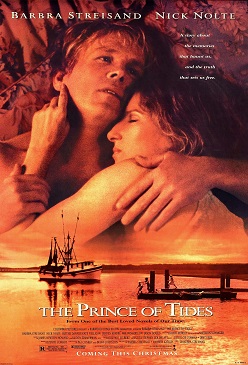
The Prince of Tides is a 1991 American romantic drama film directed and co-produced by Barbra Streisand, from a screenplay written by Pat Conroy and Becky Johnston, based on Conroy's 1986 novel of the same name. It stars Streisand and Nick Nolte. It tells the story of the narrator's struggle to overcome the psychological damage inflicted by his dysfunctional childhood in South Carolina.

Donald Patrick Conroy was an American author who wrote several acclaimed novels and memoirs; his books The Water is Wide, The Lords of Discipline, The Prince of Tides and The Great Santini were made into films, the last two being nominated for Oscars. He is recognized as a leading figure of late-20th-century Southern literature.
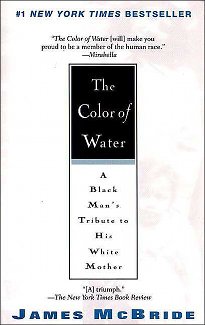
The Color of Water: A Black Man's Tribute to His White Mother, is the autobiography and memoir of James McBride first published in 1995; it is also a tribute to his mother, whom he calls Mommy, or Ma. The chapters alternate between James McBride's descriptions of his early life and first-person accounts of his mother Ruth's life, mostly taking place before McBride was born.
Beach music, also known as Carolina beach music, and to a lesser extent, beach pop, is a regional genre of music in the United States which developed from rock/R&B and pop music of the 1950s and 1960s. Beach music is most closely associated with the style of dance known as the shag, or the Carolina shag, which is also the official state dance of both North Carolina and South Carolina. Recordings with a 4/4 "blues shuffle" rhythmic structure and moderate-to-fast tempo are the most popular music for the shag, and the vast majority of the music in this genre fits that description.

Douglas Nigel Marlette was a Pulitzer Prize-winning American editorial cartoonist who, at the time of his death, had also published two novels and was "finding his voice in writing long-length fiction." His popular comic strip Kudzu, distributed by Tribune Media Services from 1981 to 2007, was adapted into a musical comedy.

Jack Osborne is a fictional character from the British soap opera Hollyoaks, played by Jimmy McKenna. The character debuted on-screen during the episode broadcast on 18 November 1996 and is the second longest featured character in the show. He was introduced as part of the Osborne family, which also consisted of Jack's wife Celia and their children Darren and Ruth. His storylines include an affair with Dawn Cunningham, four marriages and faking his own death in an insurance scam. For numerous years, Jack's role in the show is the landlord of the pub, The Dog in the Pond.
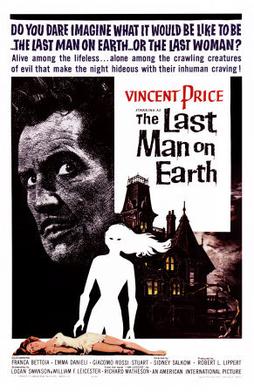
The Last Man on Earth is a 1964 post-apocalyptic science fiction horror film based on the 1954 novel I Am Legend by Richard Matheson. The film was produced by Robert L. Lippert and directed by Ubaldo Ragona and Sidney Salkow, and stars Vincent Price and Franca Bettoia. The screenplay was written in part by Matheson, but he was dissatisfied with the result and chose to be credited as "Logan Swanson". William Leicester, Furio M. Monetti, and Ubaldo Ragona finished the script.
The Omen is a media franchise, centering on a series of supernatural horror films, which began in 1976. The series centers on Damien Thorn, a child born of Satan and given to Robert and Katherine Thorn as a child. It is revealed among families that Damien is in fact meant to be the Antichrist, and as an adult is attempting to gain control of the Thorn business and reach for the presidency.
Donald Conroy was a United States Marine Corps colonel and a member of the Black Sheep Squadron during the Korean War. He was also a veteran of World War II and served two tours of duty during the Vietnam War. He is best known for being the inspiration for the character Lieutenant Colonel "Bull" Meecham in the novel The Great Santini, which was written by his son Pat Conroy.
A familicide is a type of murder or murder-suicide in which an individual kills multiple close family members in quick succession, most often children, spouses, siblings, or parents. In half the cases, the killer lastly kills themselves in a murder-suicide. If only the parents are killed, the case may also be referred to as a parricide. Where all members of a family are killed, the crime may be referred to as family annihilation.
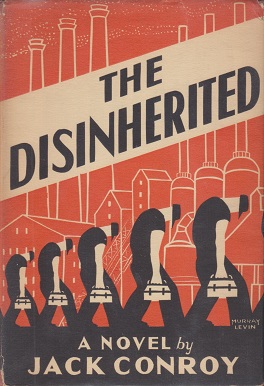
The Disinherited is a 1933 proletarian novel written by Jack Conroy. Conroy wrote it initially as nonfiction, but editors insisted he fictionalize the story for better audience reception. The novel explores the 1920s and 30s worker experience through the eyes of Larry Donovan.

The Detective is a 1968 American neo-noir crime drama film directed by Gordon Douglas, produced by Aaron Rosenberg, and starring Frank Sinatra, based on the 1966 novel of the same name by Roderick Thorp.
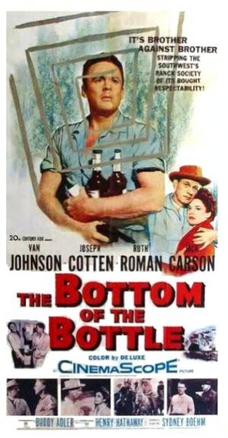
The Bottom of the Bottle is a 1956 American CinemaScope drama film directed by Henry Hathaway and starring Joseph Cotten, Van Johnson and Ruth Roman. It is based on the novel of the same title written by Georges Simenon during his stay in Nogales, Arizona. The novel was adapted for film by Sydney Boehm and was produced and distributed by 20th Century Fox.

Palm Springs Weekend is a 1963 Warner Bros. bedroom comedy film directed by Norman Taurog. It has elements of the beach party genre and has been called "a sort of Westernized version of Where the Boys Are" by Billboard magazine. It stars Troy Donahue, Stefanie Powers, Robert Conrad, Ty Hardin, and Connie Stevens.

The Prince of Tides is a novel by Pat Conroy, first published in 1986. It revolves around traumatic events that affected former football player Tom Wingo's relationship with his immediate family. As Tom grapples with his twin sister's attempted suicide and the absence of his charismatic older brother Luke, the story outlines life in the south and the events that threaten to tear Tom's family apart. The novel was adapted into a 1991 American film of the same name.

South of Broad is a 2009 novel by Pat Conroy. The novel follows the life of Leopold Bloom King in Charleston, South Carolina. It ranges from his troubled childhood to his adult life with his close group of friends.

The Echo of Youth is a lost 1919 American silent drama film written and directed by Ivan Abramson, and featuring Charles Richman, Leah Baird, Pearl Shepard, and Marie Shotwell.

Howard Clifford Rushmore was an American journalist, nationally known for investigative reporting. As a communist, he reported for The Daily Worker; later, he became anti-communist and wrote for publications including the New York Journal-American and Confidential magazine. Rushmore killed himself and his wife in a murder-suicide in 1958.
John Jackson Helm, was a lawman, cowboy, gunfighter, and inventor in the American Old West. He fought for the Confederacy during the Civil War, but worked as a lawman for the Union during Reconstruction. He was an active participant in the Sutton–Taylor feud in and about Dewitt County, Texas; and was killed in an ambush related to the feud and perpetrated by Jim Taylor and John Wesley Hardin.
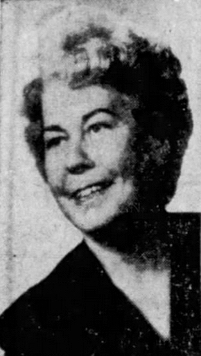
Ann Head was an American fiction writer whose work was regularly published in magazines including Redbook, Cosmopolitan, Good Housekeeping, McCall's, Ladies Home Journal, and others during the 1940s, 1950s and 1960s.














